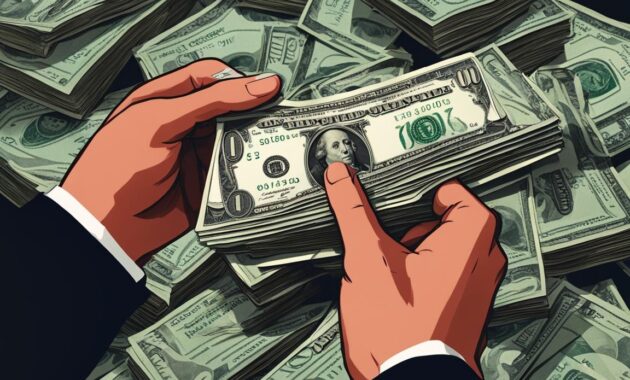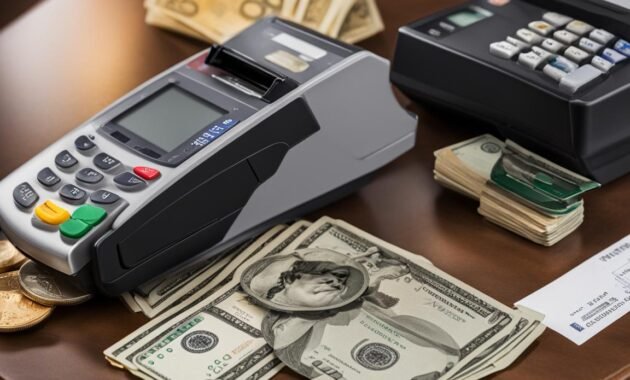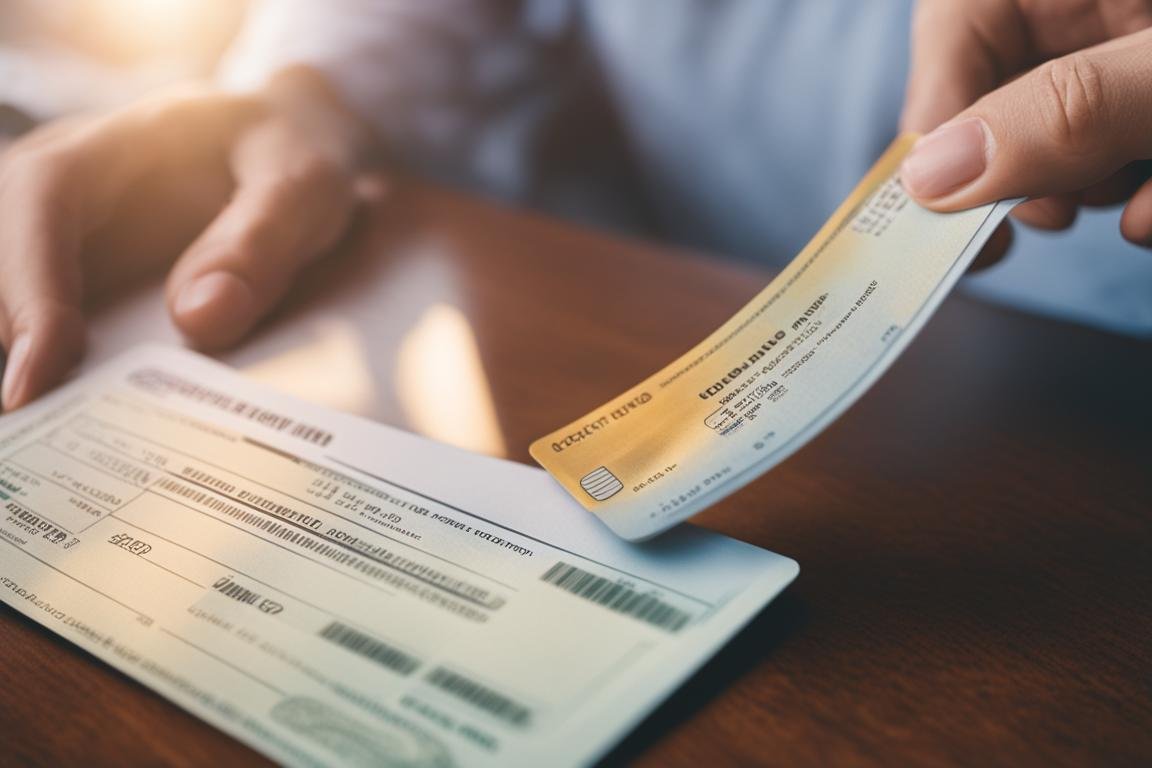Can you get a money order With a credit card : Have you ever wondered if it’s possible to purchase a money order using a credit card? In this article, we will explore the options available to you and provide valuable insights into the world of money orders and credit cards.
Many individuals prefer to use money orders for various transactions due to their secure nature. However, when it comes to buying a money order, cash or debit cards are often the preferred methods of payment. Let’s delve into the details and find out if using a credit card is a viable option.
Key Takeaways:
- Most merchants do not accept credit cards for money order purchases.
- Credit card cash advances for money order purchases come with high fees and interest rates.
- Using cash or debit cards is recommended for money order transactions.
- Explore alternative payment methods such as online money transfer apps.
- Consider the potential drawbacks and financial implications before using a credit card for money orders.
Understanding Money Orders
A money order is a secure and convenient method of payment that can be used in various situations. Unlike cash or personal checks, money orders provide a guaranteed amount of funds that can be used for domestic or international transactions. They are often used when cash or personal checks are not accepted or preferred.
Advantages of Money Orders
- Trusted and secure: Money orders are considered more secure than cash as they can be replaced if lost or stolen.
- Wide acceptance: Money orders can be used for various purposes, including paying bills, making purchases, or sending funds to family or friends.
- No bank account required: Money orders can be obtained and used by individuals who do not have a bank account.
- International use: Money orders can be sent internationally, providing a reliable and traceable payment method.
Using a money order eliminates the need to share personal banking information and reduces the risk of fraud. Money orders are also convenient for recipients who may not have access to traditional banking services.
Alternatives and Scams
While money orders offer many benefits, it is essential to be aware of alternatives and potential scams. Online money transfer apps, such as Venmo and Cash App, have gained popularity for their ease of use and instant transfer capabilities. However, fees may apply when sending money through these apps, and it is crucial to verify the recipient’s information to avoid scams.
Remember to only purchase money orders from trusted sources and be cautious of individuals or companies requesting payment solely through money orders, as this could be a potential scam.
It is also important to understand that a money order is a paper document, and therefore, it should be handled carefully to avoid damage or tampering. Always keep the receipt as proof of purchase and for tracking purposes if needed.
| Domestic Money Orders | International Money Orders |
|---|---|
| Can be purchased at various locations, including banks, post offices, and retail stores. | Available for purchase at select financial institutions and post offices. |
| Typically have lower fees compared to international money orders. | May have higher fees due to additional processing and handling. |
| Can be used to pay bills, make purchases, or send funds within the country. | Provide a reliable and traceable payment method for sending funds abroad. |
Pros and Cons of Using Money Orders
Money orders offer several advantages and disadvantages that should be considered before deciding to use them as a form of payment.
Advantages of Money Orders
- Traceability: Money orders provide a paper trail, making it easier to track the payment and ensure it reaches the intended recipient.
- Replace Lost or Stolen Money Orders: If a money order is lost or stolen, it can be replaced by the issuer, providing a level of security for both the sender and recipient.
- Accepted by Many Businesses: Money orders are widely accepted by various businesses, especially when other forms of payment, such as personal checks, may not be accepted.
Disadvantages of Money Orders
- Value Limits: Most money order issuers have limits on the amount of money that can be sent through a single money order, which may not meet the needs of larger transactions.
- Fees for Purchasing Multiple Orders: If multiple money orders are needed, each individual order may incur a separate fee, increasing the overall cost of the transaction.
- Cash or Debit Card Requirement: Money orders typically require cash or a debit card for purchase, which may not be convenient for some individuals who prefer to use credit cards or other forms of payment.
It is important to weigh these pros and cons to determine if a money order is the right payment method for your specific situation.
| Advantages of Money Orders | Disadvantages of Money Orders |
|---|---|
| Traceability | Value Limits |
| Replace Lost or Stolen Money Orders | Fees for Purchasing Multiple Orders |
| Accepted by Many Businesses | Cash or Debit Card Requirement |
As shown in the table above, money orders provide traceability and the ability to replace lost or stolen orders, making them a secure form of payment. However, there are drawbacks such as value limits, fees for purchasing multiple orders, and the need to use cash or a debit card. Consider these factors when deciding whether to use a money order as a payment method.
Can You Use a Credit Card to Purchase a Money Order?
Using a credit card for money order purchases is possible, but it is not widely accepted by most retailers. Credit card issuers often classify money order purchases as cash advances, which can come with high interest rates and fees. This can result in potential negative impacts on credit utilization and credit scores.
“Credit card issuers often classify money order purchases as cash advances, which can come with high interest rates and fees.”
While some merchants may allow credit card payments for money orders, it is important to consider the terms and conditions set by the credit card issuer. Cash advances typically have higher interest rates compared to regular credit card purchases, and they may not be eligible for earning rewards. Additionally, the credit utilization ratio, which is the amount of credit being used compared to the total credit available, can be negatively impacted by cash advances.
It is advisable to utilize cash or debit cards for money order purchases instead. These forms of payment are generally accepted by most merchants, without the potential drawbacks associated with using a credit card for money orders.
Overall, while it is technically possible to use a credit card for money order purchases, it is not the most common or recommended practice due to the associated fees, high interest rates, and potential negative impacts on credit utilization and credit scores.
Does Any Merchant Accept Credit Cards for Money Orders?
When it comes to purchasing money orders with a credit card, finding merchants that accept this form of payment can be quite challenging. Currently, major retailers like Western Union, Walmart, Moneygram, and the U.S. Postal Service do not allow customers to use credit cards for money order purchases. These merchants typically prefer cash or debit cards as the preferred payment methods.
This preference for cash or debit cards is likely due to the financial risks and high interest rates associated with credit cards. Merchants may also want to avoid potential issues with credit card chargebacks or fraudulent transactions. While it’s unfortunate for those who prefer to use their credit cards, it’s important to understand and respect the policies set by these merchants.
So, if you’re planning to get a money order, it’s advisable to have cash or a debit card on hand to complete your purchase. Remember to check with individual merchants for their specific payment options before making your way to buy a money order.
Table: Merchants and Credit Cards for Money Orders
| Merchant | Credit Cards |
|---|---|
| Western Union | No |
| Walmart | No |
| Moneygram | No |
| U.S. Postal Service | No |
Using a Credit Card for Cash Advances

When it comes to purchasing a money order with a credit card, one alternative is to consider getting a cash advance from an ATM using your credit card. While this option allows you to obtain a money order, there are several important factors to keep in mind.
Cash Advance Fees: One of the first things to consider is the cash advance fees associated with using your credit card for this purpose. Credit card cash advances often come with a flat fee or a percentage of the amount advanced, which can make this option more expensive compared to other payment methods.
Cash Advance Interest Rates: Another key consideration is the interest rates applied to cash advances. These rates are typically higher than the standard interest rates for credit card purchases, meaning that carrying a balance from a cash advance can quickly accumulate interest charges.
Paying Off Cash Advances Quickly: To minimize the impact of cash advance fees and high interest rates, it is crucial to pay off cash advances as soon as possible. This can help prevent the accumulation of excessive interest charges and keep your overall credit card balance manageable.
| Cash Advance Fees | Cash Advance Interest Rates | Paying Off Cash Advances Quickly |
|---|---|---|
| Can be expensive compared to other payment methods | Typically higher than standard interest rates | Minimizes interest charges and keeps credit card balance manageable |
Rewards and Money Order Purchases

When it comes to purchasing money orders, one may wonder whether there are any rewards associated with using a credit card. Unfortunately, credit card rewards for money order purchases are generally not available. Most credit card issuers exclude cash advances, including those used for money orders, from their reward programs. This means that using a credit card to buy a money order is unlikely to provide any rewards or benefits typically associated with regular credit card purchases.
While it may be disappointing to miss out on rewards, it’s important to understand why credit card issuers exclude money order purchases from their reward programs. Cash advances, including money orders, often incur high fees and interest rates. Credit card companies see these transactions as higher risk and may charge additional fees or classify them as cash advances, which have different terms and conditions compared to regular purchases. As a result, credit card rewards for money order purchases are not typically offered.
Therefore, if you’re looking to earn rewards on your purchases, it’s recommended to explore other payment methods or types of transactions that are eligible for rewards. Using a credit card for regular purchases, such as groceries or online shopping, may provide opportunities to earn rewards and maximize the benefits of your credit card. It’s always a good idea to review the terms and conditions of your credit card rewards program to understand which transactions qualify for rewards and which do not.
Overall, while credit cards can be a convenient form of payment, it’s important to consider the limitations and potential drawbacks when it comes to using them for money order purchases. Since rewards for these transactions are typically not available and cash advances may come with high fees and interest rates, it may be more advantageous to use alternative payment methods for money orders, such as cash or debit cards. It’s always wise to assess your financial situation and choose the payment method that aligns with your goals and priorities.
Alternatives to Credit Card Purchases for Money Orders

While using a credit card for money order purchases may not be widely accepted, there are alternative payment methods available that can still fulfill your needs. If you’re unable to use a credit card, consider the following options:
1. Cash or Debit Cards
Most merchants accept cash or debit card payments for money orders. By using cash or a debit card, you can easily purchase a money order without the need for a credit card. This is a convenient and widely accepted method of payment for money orders.
2. Online Money Transfer Apps
With the rise of digital technology, online money transfer apps have become increasingly popular. Services like Venmo and Cash App allow you to send money quickly and securely from your smartphone. While these apps may not offer traditional money orders, they provide a convenient alternative for transferring funds.
3. Bank Transfers
If you have a bank account, you can consider using bank transfers to send money. Many banks offer online banking services that allow you to transfer funds to another person or business. This method can be convenient and provides a secure way to send money without the need for a credit card or money order.
By exploring these alternatives, you can find a payment method that suits your needs and preferences. Whether it’s using cash or debit cards, online money transfer apps, or bank transfers, there are options available that can help you complete your financial transactions without relying on credit cards for money orders.
In summary, while using a credit card for money order purchases may not be widely accepted, there are various alternatives to consider. By utilizing cash or debit cards, online money transfer apps, or bank transfers, you can still fulfill your financial needs without the need for a credit card. Explore these alternatives and choose the method that best fits your preferences and convenience.
The Bottom Line on Using Credit Cards for Money Orders
After exploring the options and considerations for using credit cards to purchase money orders, it is clear that this is not a widely accepted practice and comes with potential drawbacks. Although some merchants may allow credit card transactions for money orders, most prefer cash or debit cards due to the financial risks and high interest rates associated with credit cards.
One of the main drawbacks of using a credit card for money order purchases is the classification of these transactions as cash advances by credit card issuers. Cash advances often come with higher interest rates and fees compared to regular credit card purchases, which can lead to financial challenges if not managed properly. Additionally, cash advances may impact credit utilization and potentially have negative effects on credit scores.
Considering these factors, it is generally recommended to use cash or debit cards when purchasing money orders. These payment methods are more widely accepted by merchants and do not come with the same risks and potential negative consequences as using a credit card for this purpose. Furthermore, exploring alternative payment methods like online money transfer apps can provide convenient and secure options for sending money without the need for money orders or credit cards.
“Using a credit card for money orders is not a widely accepted practice due to the financial risks and high interest rates associated with credit cards.”
| Considerations for Using Credit Cards for Money Orders | Potential Drawbacks of Credit Card Money Order Purchases |
|---|---|
|
|
In conclusion, while it may be possible to use a credit card for money order purchases, it is not a recommended or widely accepted practice. The financial risks, high interest rates, and limited acceptance by merchants make cash or debit cards the preferred payment methods for purchasing money orders. When considering alternative payment options, online money transfer apps can provide convenient and secure alternatives to both credit card and money order transactions.
Conclusion
In summary, when it comes to purchasing a money order, using a credit card is not a widely accepted or recommended practice. Most merchants do not accept credit cards for money order purchases, and if they do, it is often classified as a cash advance, which incurs high fees and interest rates.
It is important to carefully consider the potential drawbacks of using a credit card for money order purchases. The financial risks and implications, including the impact on credit scores and utilization ratios, should be taken into account.
Instead, it is generally recommended to use cash or debit cards for money order purchases. These forms of buy money orders payment are widely accepted and can help avoid the additional fees and interest charges associated with credit cards.
Overall, exploring alternative payment methods, such as online money transfer apps, can also be beneficial. These options provide a convenient and cost-effective way to send money order alternatives without the need for money orders or credit cards.
Also Read : Quick Steps To Withdraw Cash From Credit Card Safely!
FAQs
A: No, you cannot typically buy a money order with a credit card. Most establishments that sell money orders, including post offices and banks, require payment in cash or a debit card.
Q: Are there any alternatives to using a credit card to pay for a money order?
A: Yes, you can use cash, a debit card, or sometimes a traveler’s check to pay for a money order.
Q: Can I use a credit card to pay for a money order as a form of transfer of money to another party?
A: No, money orders are usually purchased upfront with cash or a debit card, so you cannot directly use a credit card for this purpose.
Q: Can I cash a money order using a credit card?
A: No, you generally cannot cash a money order with a credit card. Money orders are usually cashed at the issuer’s location or through a bank or credit union, and they may require cash or a debit card for the transaction.
Q: Is it a good idea to use a credit card to purchase a money order?
A: It is generally not advisable to use a credit card to buy a money order, as it could be considered a cash advance by your credit card company and may incur fees and higher interest rates.
Q: Do I need a credit card to buy a money order?
A: No, a credit card is not needed to buy a money order. Cash, debit cards, and sometimes traveler’s checks are acceptable forms of payment.
Q: Where can I purchase a money order with a credit card?
A: It is rare to find a place that allows you to buy a money order with your credit card. Most establishments will require cash or a debit card as payment for a money order.
Q: Are there any potential scams involving the use of a credit card to buy a money order?
A: Yes, some scams may involve using stolen credit cards to purchase money orders, so it is important to be cautious and verify the allow you to pay legitimacy of any transaction involving money orders many credit card and credit cards.
Q: Can I buy a money order with cash from the back of the money order?
A: Yes, you can purchase a money order with cash from the back of the money order many credit at certain locations, such as a bank or a post office.
Q: Is a money order similar to using a debit card or cash?
A: In some ways, a money order is similar to using a debit card or cash, as it is a buy one secure form of payment and is widely accepted by various recipients as a reliable method of transferring funds.
Source Links
- https://wallethub.com/edu/cc/can-you-buy-a-money-order-with-a-credit-card/20407
- https://www.forbes.com/advisor/credit-cards/can-you-buy-a-money-order-with-your-credit-card/
- https://www.bankrate.com/finance/credit-cards/how-to-buy-money-order-with-credit-card/
